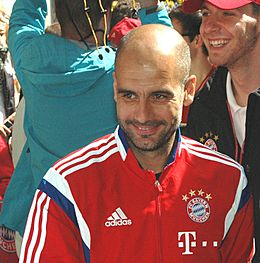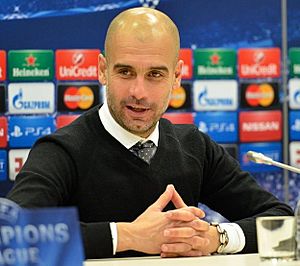Pep Guardiola facts for kids
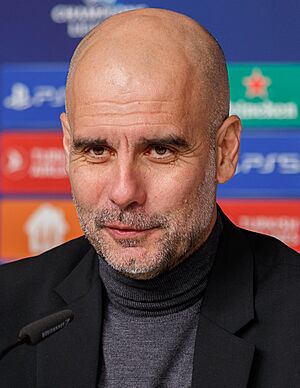
Guardiola with Manchester City in 2023
|
||||||||||||||||
| Personal information | ||||||||||||||||
|---|---|---|---|---|---|---|---|---|---|---|---|---|---|---|---|---|
| Full name | Josep Guardiola Sala | |||||||||||||||
| Date of birth | 18 January 1971 | |||||||||||||||
| Place of birth | Santpedor, Spain | |||||||||||||||
| Height | 1.80 m (5 ft 11 in) | |||||||||||||||
| Position(s) | Defensive midfielder | |||||||||||||||
| Team information | ||||||||||||||||
|
Current team
|
Manchester City (manager) | |||||||||||||||
| Youth career | ||||||||||||||||
| 1981–1984 | Gimnàstic Manresa | |||||||||||||||
| 1984–1990 | Barcelona | |||||||||||||||
| Senior career* | ||||||||||||||||
| Years | Team | Apps | (Gls) | |||||||||||||
| 1988–1989 | Barcelona C | 8 | (1) | |||||||||||||
| 1990–1992 | Barcelona B | 53 | (5) | |||||||||||||
| 1990–2001 | Barcelona | 263 | (6) | |||||||||||||
| 2001–2002 | Brescia | 11 | (2) | |||||||||||||
| 2002–2003 | Roma | 4 | (0) | |||||||||||||
| 2003 | Brescia | 13 | (1) | |||||||||||||
| 2003–2005 | Al-Ahli | 36 | (5) | |||||||||||||
| 2005–2006 | Dorados | 10 | (1) | |||||||||||||
| Total | 398 | (21) | ||||||||||||||
| International career | ||||||||||||||||
| 1991 | Spain U21 | 2 | (0) | |||||||||||||
| 1991–1992 | Spain U23 | 12 | (2) | |||||||||||||
| 1992–2001 | Spain | 47 | (5) | |||||||||||||
| 1995–2005 | Catalonia | 7 | (0) | |||||||||||||
| Managerial career | ||||||||||||||||
| 2007–2008 | Barcelona B | |||||||||||||||
| 2008–2012 | Barcelona | |||||||||||||||
| 2013–2016 | Bayern Munich | |||||||||||||||
| 2016– | Manchester City | |||||||||||||||
|
Medal record
|
||||||||||||||||
| *Club domestic league appearances and goals | ||||||||||||||||
Josep "Pep" Guardiola Sala (born 18 January 1971) is a famous Spanish football manager and former player. He has been the manager of Manchester City since 2016. Guardiola is one of only two managers in history to win the continental treble (winning the league, main cup, and Champions League in one season) twice. He also holds records for the most consecutive league games won in Spain, Germany, and England. Many people consider him one of the greatest football managers ever.
As a player, Guardiola was a defensive midfielder. He spent most of his career with Barcelona. He was a key part of Johan Cruyff's "Dream Team," which won Barcelona's first European Cup in 1992. They also won four Spanish league titles in a row from 1991 to 1994. He was the team captain from 1997 until he left Barcelona in 2001. After Barcelona, he played for teams in Italy, Qatar, and Mexico. He played 47 times for the Spanish national team and played in the 1994 FIFA World Cup and UEFA Euro 2000. He is seen as one of the best defensive midfielders of all time.
After he stopped playing, Guardiola managed Barcelona B and helped them win a league title. In 2008, he became the manager of Barcelona's main team. In his first season, he led Barcelona to a historic treble. This included winning La Liga, the Copa del Rey, and the UEFA Champions League. He was the youngest manager to win the Champions League at that time. He won the FIFA World Coach of the Year award in 2011. Guardiola left Barcelona in 2012 with 14 trophies, a club record.
In 2013, Guardiola joined Bayern Munich in Germany. He won the Bundesliga title in all three seasons he was there. He also won two domestic doubles (league and main cup). In 2016, he moved to Manchester City. Since then, he has won six Premier League titles, including four in a row from 2019 to 2024. This was the first time any team in English top-flight history achieved this. In his second season, his team broke many records, becoming the first to get 100 points in a single season. He also led City to a domestic treble in 2018–19. Guardiola guided City to their first Champions League final in 2021 and their first Champions League title in 2023. This Champions League win completed his second continental treble.
Playing Career Highlights
Starting at Barcelona's Youth Academy
Josep Guardiola was born in Santpedor, Spain. He joined La Masia, Barcelona's famous youth academy, when he was 13 years old. He spent six years learning and growing there. He made his first team debut in 1990.
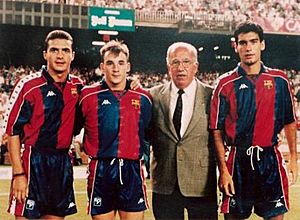
A famous coach, Johan Cruyff, saw Guardiola play for Barcelona's B team. Cruyff noticed his talent and told the youth team manager to move him to the central midfield position. Guardiola quickly adapted to this new role. When he joined the first team in 1990, he became the key central player for Cruyff's "Dream Team."
Success with the Dream Team
Guardiola became a regular player in the 1991–92 season. At just 20 years old, he was a vital part of the team that won La Liga and the European Cup. This was Barcelona's first European Cup win. The "Dream Team" continued to win La Liga titles in 1992–93 and 1993–94. They also reached the 1994 UEFA Champions League final but lost to AC Milan.
Even after Cruyff left in 1996, Guardiola remained at the heart of Barcelona's midfield. In the 1996–97 season, Barcelona won three cups: the Copa del Rey, the Spanish Super Cup, and the European Cup Winners' Cup. In 1997, Guardiola became Barcelona's captain. He helped the team win a league and cup double in the 1997–98 season.
Leaving Barcelona
On 11 April 2001, Guardiola announced he would leave Barcelona after 17 years. He felt football was changing and becoming more physical. On 24 June 2001, he played his last game for Barcelona. He played 479 games and won 16 trophies with the first team. Many future Barcelona midfielders, like Xavi and Andrés Iniesta, looked up to Guardiola as their hero.
Later Playing Career
After leaving Barcelona, Guardiola joined Serie A team Brescia in Italy in 2001. He played alongside famous player Roberto Baggio. After Brescia, he moved to Roma.
In 2003, Guardiola played in Qatar for Al-Ahli. He stayed there until 2005. In 2006, he played for the Mexican club Dorados for six months before retiring. He scored one goal for the club.
International Football
Playing for Spain
On 14 October 1992, Guardiola played his first game for the Spain national football team. In the same year, he helped the Spanish Under-23 team win a gold medal at the Barcelona Olympic Games. He also won the Bravo Award in 1992, given to the world's best player under 21.
Guardiola was part of the Spanish team at the 1994 FIFA World Cup. Spain reached the quarter-finals but lost to Italy. He later played at UEFA Euro 2000, where Spain again reached the quarter-finals, losing to France. His last game for Spain was on 14 November 2001. He scored 5 goals in 47 appearances for Spain.
Playing for Catalonia
Guardiola also played for the Catalonia football team. Between 1995 and 2005, he played seven friendly matches for Catalonia. He has always supported the team.
Player Style and Influence
How Guardiola Played
Guardiola was a very creative and hard-working player. He was known for his good understanding of the game and his ability to read plays. He usually played as a central or defensive midfielder. He was good at winning the ball back and keeping possession.
Even though he wasn't very fast or strong, Guardiola was highly respected for his vision and passing skills. He could control the ball well and make quick, accurate passes. He could also switch the play with longer passes to create chances. He was a leader on the field, serving as captain for both Barcelona and Spain.
What Others Said About Him
Guardiola's playing style, which focused on skill and ball movement, inspired many future Spanish midfielders. Players like Xavi, Andrés Iniesta, and Cesc Fàbregas have called him their "idol." Former Barcelona president Joan Laporta called him "the best central midfielder in our history." Johan Cruyff also thought he was one of the best midfielders of his time.
Many experts consider Guardiola one of the greatest Spanish players ever. They describe him as the "brains of Barcelona's Dream Team." He was known as one of the best deep-lying playmakers in European football during his prime.
Managerial Career
Starting at Barcelona
Barcelona B Team Success
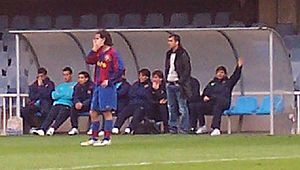
Guardiola became the manager of Barcelona B on 21 June 2007. With his help, the team won their league group and earned promotion. Barcelona's president then announced that Guardiola would become the manager of the main Barcelona team in 2008.
Historic Treble in 2008–09
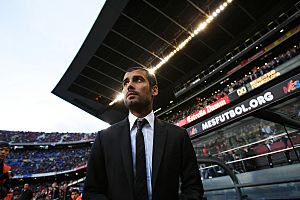
When Guardiola took over, he made big changes. He brought in new players like Dani Alves and Gerard Piqué. He also promoted young players from the academy, such as Sergio Busquets and Pedro. Guardiola emphasized hard work and a close relationship with his players.
Barcelona started the 2008–09 season with a loss but then went on a long unbeaten run. They won their first La Liga title since 2006. A key moment was their 6–2 win against rivals Real Madrid. On 13 May, Barcelona won the 2008–09 Copa del Rey, beating Athletic Bilbao.
In the Champions League final, Barcelona beat Manchester United 2–0. This made them the first Spanish club to win the domestic cup, the league, and the European Champions League in the same season. This is known as winning the treble. Guardiola became the youngest manager to win the Champions League at 37. This season is seen as one of the best in the club's history.
Winning Six Trophies in 2009–10
Guardiola's second season began with more wins. Barcelona won the Spanish Super Cup and the UEFA Super Cup. In December 2009, they won the FIFA Club World Cup for the first time.
Guardiola ended 2009 with a record six trophies in one calendar year. This included the Spanish League, Copa del Rey, Champions League, Spanish Super Cup, European Super Cup, and Club World Cup. He was the first manager in history to achieve this. In February 2010, he managed his 100th game for Barcelona. He also became the first Barcelona manager to beat Real Madrid four times in a row. Barcelona won their 20th La Liga title with 99 points, a record at the time.
Second Champions League Title in 2010–11
On 21 August 2010, Barcelona won their second straight Spanish Super Cup. On 29 November 2010, Barcelona beat Real Madrid 5–0, giving Guardiola five straight wins in El Clásico.
On 11 May 2011, Barcelona won their third straight La Liga title. On 28 May, Barcelona beat Manchester United 3–1 in the 2011 Champions League final at Wembley.
Final Season at Barcelona in 2011–12
The 2011–12 season started with another Spanish Super Cup win against Real Madrid. Barcelona then won their second trophy of the season, beating Porto in the UEFA Super Cup. With this win, Guardiola became the record holder for most titles won as a manager at Barcelona, with 12 trophies in just three years.
In November 2011, Guardiola managed his 200th game for Barcelona. Barcelona ended 2011 by winning the Club World Cup, beating Santos 4–0. This was Guardiola's 13th title. In January 2012, he was named FIFA World Coach of the Year.
On 27 April 2012, Guardiola announced he would leave Barcelona at the end of the season. He said he was tired and that four years at a club like Barcelona felt like a very long time. He led Barcelona to a 3–0 win in the Copa del Rey final. His record of 14 trophies in four seasons made him the most successful manager in Barcelona's history.
Break from Football
After leaving Barcelona, Guardiola took a year off in New York City. He said he wanted to return to coaching but hadn't decided where yet.
Managing Bayern Munich
Winning Bundesliga Titles (2013–2015)
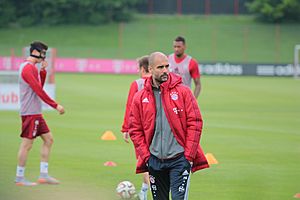
On 16 January 2013, it was announced that Guardiola would become the manager of German club Bayern Munich after the 2012–13 season. He gave his first press conference in German on 24 June 2013. His first trophy with Bayern was the 2013 UEFA Super Cup, where they beat Chelsea.
In December 2013, Guardiola won his third Club World Cup title. On 25 March 2014, he led Bayern to their 23rd Bundesliga title. They won it with seven matches left in the season, which was the earliest any team had won the championship in Bundesliga history. Guardiola also set a record for the longest winning streak to start his time at a Bundesliga club.
Bayern reached the Champions League semi-finals but lost to Real Madrid. He finished the 2013–14 season by winning the German Cup.
In the 2014–15 season, Bayern lost the German Super Cup. In the Champions League, Bayern reached their fourth straight semi-final. However, they were knocked out of the German Cup and lost to Barcelona in the Champions League semi-finals.
Final Season at Bayern (2015–16)
The 2015–16 season started with a loss in the German Super Cup. In the league, Bayern won their first ten matches. On 20 December, Bayern announced that Guardiola would leave the club after his contract ended at the end of the season.
On 3 May 2016, Bayern lost to Atlético Madrid in the Champions League semi-finals. This meant Guardiola would not win a Champions League title with Bayern. His final match was on 21 May 2016, when Bayern won the German Cup in a penalty shootout.
Managing Manchester City
First Season and Adjustments (2016–17)
On 1 February 2016, Manchester City signed Guardiola to a three-year contract. He brought in several new players, including İlkay Gündoğan, Leroy Sané, and John Stones. He also changed the starting goalkeeper, replacing Joe Hart with Claudio Bravo.
On 13 August 2016, Guardiola won his first Premier League match. On 11 September, he won his first Manchester derby against José Mourinho's Manchester United.
City's form dropped later in the season. They lost 0–4 to Everton, which was Guardiola's biggest ever loss in a domestic league. In the Champions League, City were knocked out in the round of 16. Guardiola finished his first season without a trophy, which was a first in his managerial career.
"Centurions" and First Premier League Title (2017–18)

Guardiola focused on improving City's defense. They signed new goalkeeper Ederson and full-backs Benjamin Mendy and Kyle Walker.
On 25 February 2018, City won the 2017–18 EFL Cup by beating Arsenal 3–0. This was Guardiola's first trophy with Manchester City. On 15 April, City were confirmed as 2017–18 Premier League champions. They finished the season with a record-breaking 100 points, earning them the nickname "Centurions." After this success, Guardiola signed a new contract until 2021.
Domestic Treble and Champions League Challenges (2018–2020)
In Guardiola's third season, Manchester City signed Riyad Mahrez. On 5 August 2018, City won the 2018 FA Community Shield.
On 24 February 2019, City won the EFL Cup final against Chelsea in a penalty shootout. In the Champions League quarter-finals, City lost to Tottenham Hotspur on away goals after a thrilling 4–4 aggregate draw. On 12 May, Guardiola secured a second consecutive Premier League title. His team finished with 98 points, just one point ahead of Liverpool. On 18 May, City beat Watford 6–0 in the FA Cup final. This made them the first men's team in England to win a domestic treble (Premier League, FA Cup, and EFL Cup).
In 2019, City signed João Cancelo and Rodri. On 4 August 2019, City won the Community Shield again. On 1 March 2020, Manchester City won the 2020 EFL Cup final, their third in a row. City finished second in the 2019–20 Premier League. In the Champions League, City were eliminated in the quarter-finals by Lyon.
Four Premier League Titles in a Row and Champions League Win (2020–2024)
The 2020–21 season saw City's defense greatly improve. On 19 November 2020, Guardiola signed a new contract until 2023. He won his 500th game as manager on 31 January 2021. City also broke the record for the longest winning run in English top-flight football history with fifteen straight victories.
Guardiola won his third Premier League title on 11 May 2021. Two weeks earlier, they had won the 2021 EFL Cup final, their fourth in a row. On 29 May, Manchester City played in their first ever Champions League final, but lost to Chelsea 0–1.
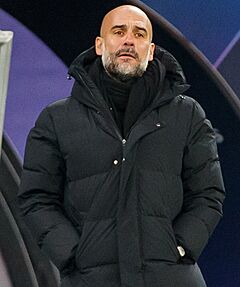
In 2021, Manchester City signed Jack Grealish for a British transfer record fee. On 25 September, Guardiola became the manager with the most wins in Manchester City history. On 22 May 2022, Manchester City won the Premier League again, their fourth under Guardiola.
During the 2022–23 season, Manchester City won their third consecutive Premier League title, their fifth under Guardiola. On 23 November 2022, he signed a new contract until 2025. On 3 June 2023, the club won their second FA Cup under Guardiola, beating Manchester United 2–1. On 10 June 2023, he led the club to their first Champions League title, and his personal third. This win completed their continental treble.
On 16 August 2023, Guardiola won a record-equaling fourth UEFA Super Cup title. He became the first manager to win this trophy with three different clubs. On 22 December, Guardiola guided City to their first FIFA Club World Cup trophy. They beat Fluminense 4–0, becoming the first English club to win five titles in a calendar year. Guardiola also became the first manager in history to win four FIFA Club World Cup titles.
Man City's Champions League journey ended in the quarter-finals in 2024, losing to Real Madrid. On 19 May 2024, Man City won their fourth straight Premier League title, becoming the first English club to do so. A week later, they lost the FA Cup Final to Manchester United.
Recent Challenges (2024–present)
Manchester City's 2024–25 season started well, winning the Community Shield and having an unbeaten run in the league. However, their form changed after a loss to Tottenham Hotspur in the EFL Cup. They then won only one of their next thirteen matches.
On 9 November 2024, Man City lost to Brighton & Hove Albion, marking the first time Guardiola had suffered four losses in a row in regular time as a manager. On 22 November 2024, Guardiola signed a new contract extension until 2027. However, the next day, Manchester City suffered their heaviest home defeat under Guardiola, losing 4–0 to Tottenham Hotspur.
On 19 February 2025, Manchester City was knocked out of the Champions League by Real Madrid. This was their first time failing to reach the round of sixteen since 2012–13. Guardiola openly criticized his own performance during this difficult period.
Manchester City reached the FA Cup Final for the third season in a row but lost 1–0 to Crystal Palace. This was their second FA Cup final defeat in a row and the first time Guardiola had lost two finals in a row in the same competition. It also meant Manchester City finished a season without a major trophy for the first time since 2016–17. On the final day of the season, Manchester City finished third in the Premier League, their worst league finish since 2016–17.
Managerial Style
Tactics and Strategy
Guardiola's teams are known for keeping possession of the ball. They try to make the opposing team chase the ball for long periods. His teams also press opponents hard when they don't have the ball, especially high up the pitch. This helps them win the ball back quickly.
Guardiola likes goalkeepers and defenders who are good with the ball. They can pass short or long, helping the team build attacks from the back. At Manchester City, goalkeeper Ederson often made accurate long passes that created scoring chances.
Guardiola constantly tries to improve his tactics. He was influenced by Total Football from Johan Cruyff. He also learned from his friend and manager, Juan Manuel Lillo, in Mexico. Guardiola has said that his "football education comes from [Catalunya]," which focuses on possession-based play.
He has used different formations throughout his career. At Barcelona, he often used a 4–3–3 formation with attacking wingers and full-backs. He also sometimes used a 3–4–3 formation. At Bayern Munich and Manchester City, he continued to use these formations. He also used a "false 9" player, like Lionel Messi, who would drop deep to create more players in midfield. At Manchester City, he used a modern 3–2–2–3 formation in the 2022–23 season. He also used defenders in new midfield roles and played a more direct style with striker Erling Haaland.
What Others Say About His Coaching
Many experts consider Guardiola one of the greatest managers of all time. He is often linked to the success of the Spanish and German national teams in the 2010s, as many of their players were coached by him.
Jürgen Klopp, another top manager, has said that Guardiola builds the toughest teams he has ever faced. He believes they push each other to incredible levels.
Some people have criticized Guardiola's style, saying that focusing too much on ball possession can make defenders less skilled at traditional defending. However, many of Guardiola's former players and coaches have gone on to become successful managers themselves, citing him as an inspiration.
Personal Life
Pep Guardiola was born to Dolors and Valentí. He has two older sisters and a younger brother, Pere Guardiola, who is a football agent. Guardiola met his wife Cristina Serra when he was 18. They married on 29 May 2014. They have three children: Maria, Màrius, and Valentina.
After leaving Barcelona, he lived in New York City for a year. To prepare for his job at Bayern Munich, Guardiola studied German for several hours each day.
Guardiola supports the political independence of Catalonia. In 2015, he joined a group supporting independence in the regional election.
In May 2023, Guardiola made a short appearance in the TV show Ted Lasso. He reportedly enjoys watching the show with his family.
Career Statistics
Player Statistics
| Club | Season | League | National Cup | Continental | Other | Total | ||||||
|---|---|---|---|---|---|---|---|---|---|---|---|---|
| Division | Apps | Goals | Apps | Goals | Apps | Goals | Apps | Goals | Apps | Goals | ||
| Barcelona C | 1988–89 | Segunda División B | 8 | 1 | 0 | 0 | — | — | 8 | 1 | ||
| Barcelona B | 1989–90 | Segunda División B | 11 | 0 | 0 | 0 | — | — | 11 | 0 | ||
| 1990–91 | Segunda División B | 33 | 3 | — | — | 6 | 0 | 39 | 3 | |||
| 1991–92 | Segunda División | 9 | 2 | — | — | — | 9 | 2 | ||||
| Total | 53 | 5 | 0 | 0 | — | 6 | 0 | 59 | 5 | |||
| Barcelona | 1990–91 | La Liga | 4 | 0 | 0 | 0 | — | — | 4 | 0 | ||
| 1991–92 | La Liga | 26 | 0 | 0 | 0 | 11 | 0 | 2 | 0 | 39 | 0 | |
| 1992–93 | La Liga | 28 | 0 | 3 | 1 | 5 | 0 | 3 | 0 | 39 | 1 | |
| 1993–94 | La Liga | 34 | 0 | 3 | 0 | 9 | 0 | 2 | 0 | 48 | 0 | |
| 1994–95 | La Liga | 24 | 2 | 2 | 0 | 6 | 0 | 2 | 0 | 34 | 2 | |
| 1995–96 | La Liga | 32 | 1 | 7 | 0 | 8 | 1 | — | 47 | 2 | ||
| 1996–97 | La Liga | 38 | 0 | 6 | 0 | 7 | 1 | 2 | 0 | 53 | 1 | |
| 1997–98 | La Liga | 6 | 0 | 1 | 0 | 5 | 0 | 2 | 0 | 14 | 0 | |
| 1998–99 | La Liga | 22 | 1 | 3 | 0 | 1 | 0 | 0 | 0 | 26 | 1 | |
| 1999–2000 | La Liga | 25 | 0 | 2 | 0 | 12 | 1 | 2 | 0 | 41 | 1 | |
| 2000–01 | La Liga | 24 | 2 | 6 | 1 | 7 | 0 | — | 37 | 3 | ||
| Total | 263 | 6 | 33 | 2 | 71 | 3 | 15 | 0 | 382 | 11 | ||
| Brescia | 2001–02 | Serie A | 11 | 2 | 0 | 0 | — | — | 11 | 2 | ||
| Roma | 2002–03 | Serie A | 4 | 0 | 0 | 0 | 1 | 0 | — | 5 | 0 | |
| Brescia | 2002–03 | Serie A | 13 | 1 | 0 | 0 | — | — | 13 | 1 | ||
| Al-Ahli | 2003–04 | Qatar Stars League | 18 | 2 | ? | 0 | — | ? | ? | 18+ | 2 | |
| 2004–05 | Qatar Stars League | 18 | 3 | ? | 1 | ? | 1 | ? | ? | 18+ | 5 | |
| Total | 36 | 5 | ? | 1 | ? | 1 | ? | ? | 36+ | 7 | ||
| Dorados | 2005–06 | Mexican Primera División | 10 | 1 | ? | ? | — | — | 10+ | 1+ | ||
| Career total | 398 | 21 | 33+ | 3+ | 72+ | 4 | 21+ | 0 | 524+ | 28+ | ||
International Goals
| National team | Year | Apps | Goals |
|---|---|---|---|
| Spain | 1992 | 2 | 1 |
| 1993 | 5 | 0 | |
| 1994 | 7 | 1 | |
| 1995 | 0 | 0 | |
| 1996 | 5 | 1 | |
| 1997 | 4 | 1 | |
| 1998 | 0 | 0 | |
| 1999 | 9 | 0 | |
| 2000 | 8 | 1 | |
| 2001 | 7 | 0 | |
| Total | 47 | 5 | |
- Scores and results list Spain's goal tally first, score column indicates score after each Guardiola goal
| No. | Date | Venue | Cap | Opponent | Score | Result | Competition |
|---|---|---|---|---|---|---|---|
| 1 | 16 December 1992 | Ramón Sánchez Pizjuán, Seville, Spain | 2 | 2–0 | 5–0 | 1994 FIFA World Cup qualification | |
| 2 | 27 June 1994 | Soldier Field, Chicago, United States | 12 | 1–0 | 3–1 | 1994 FIFA World Cup | |
| 3 | 14 December 1996 | Mestalla, Valencia, Spain | 18 | 1–0 | 2–0 | 1998 FIFA World Cup qualification | |
| 4 | 12 February 1997 | José Rico Pérez, Alicante, Spain | 20 | 1–0 | 4–0 | 1998 FIFA World Cup qualification | |
| 5 | 3 June 2000 | Ullevi, Gothenburg, Sweden | 35 | 1–0 | 1–1 | Friendly |
Managerial Record
| Team | From | To | Record | Ref. | ||||
|---|---|---|---|---|---|---|---|---|
| P | W | D | L | Win % | ||||
| Barcelona B | 21 June 2007 | 30 June 2008 | 42 | 28 | 9 | 5 | 66.67 | |
| Barcelona | 1 July 2008 | 30 June 2012 | 247 | 179 | 47 | 21 | 72.47 | |
| Bayern Munich | 26 June 2013 | 30 June 2016 | 161 | 121 | 21 | 19 | 75.16 | |
| Manchester City | 1 July 2016 | Present | 533 | 376 | 77 | 80 | 70.54 | |
| Total | 983 | 704 | 154 | 125 | 71.62 | |||
Trophies and Awards
As a Player
Barcelona B
- Segunda División B: 1990–91
Barcelona
- La Liga: 1990–91, 1991–92, 1992–93, 1993–94, 1997–98, 1998–99
- Copa del Rey: 1996–97, 1997–98
- Supercopa de España: 1991, 1992, 1994, 1996
- European Cup: 1991–92
- UEFA Cup Winners' Cup: 1996–97
- European Super Cup: 1992
Spain U23
- Olympic Games Gold Medal: 1992
Individual Awards
- Bravo Award: 1992
- Olympics – Spain Best Player: 1992
As a Manager
Barcelona B
- Tercera División: 2007–08
Barcelona
- La Liga: 2008–09, 2009–10, 2010–11
- Copa del Rey: 2008–09, 2011–12
- Supercopa de España: 2009, 2010, 2011
- UEFA Champions League: 2008–09, 2010–11
- UEFA Super Cup: 2009, 2011
- FIFA Club World Cup: 2009, 2011
Bayern Munich
- Bundesliga: 2013–14, 2014–15, 2015–16
- DFB-Pokal: 2013–14, 2015–16
- UEFA Super Cup: 2013
- FIFA Club World Cup: 2013
Manchester City
- Premier League: 2017–18, 2018–19, 2020–21, 2021–22, 2022–23, 2023–24
- FA Cup: 2018–19, 2022–23
- EFL Cup: 2017–18, 2018–19, 2019–20, 2020–21
- FA Community Shield: 2018, 2019, 2024
- UEFA Champions League: 2022–23
- UEFA Super Cup: 2023
- FIFA Club World Cup: 2023
Individual Manager Awards
- Don Balón Award: 2009, 2010
- Miguel Muñoz Trophy: 2008–09, 2009–10
- Onze d'Or Coach of the Year: 2009, 2011, 2012
- World Soccer Magazine World Manager of the Year: 2009, 2011
- IFFHS World's Best Club Coach: 2009, 2011, 2023
- UEFA Team of the Year Best Coach: 2008–09, 2010–11
- La Liga Coach of the Year: 2009, 2010, 2011, 2012
- FIFA World Coach of the Year: 2011
- Globe Soccer Awards Coach Career Award: 2013
- Globe Soccer Awards Coach of the Century: 2020
- Premier League Manager of the Month: February 2017, September 2017, October 2017, November 2017, December 2017, February 2019, April 2019, January 2021, February 2021, November 2021, December 2021
- Premier League Manager of the Season: 2017–18, 2018–19, 2020–21, 2022–23, 2023–24
- LMA Manager of the Year: 2017–18, 2020–21, 2022–23
- LMA Premier League Manager of the Year: 2017–18, 2020–21, 2022–23, 2023–24
- League Managers Association (LMA) Hall of Fame
- UEFA Men's Coach of the Year: 2022–23
- The Best FIFA Football Coach: 2022–23
Decorations
- Gold Medal Royal Order of Sports Merit: 2010
- Catalan of the Year Award: 2009
See also
 In Spanish: Pep Guardiola para niños
In Spanish: Pep Guardiola para niños
- List of La Liga winning managers
- List of Bundesliga winning managers
- List of English football championship-winning managers
- List of FA Cup winning managers
- List of European Cup and UEFA Champions League winning managers
- List of UEFA Super Cup winning managers


